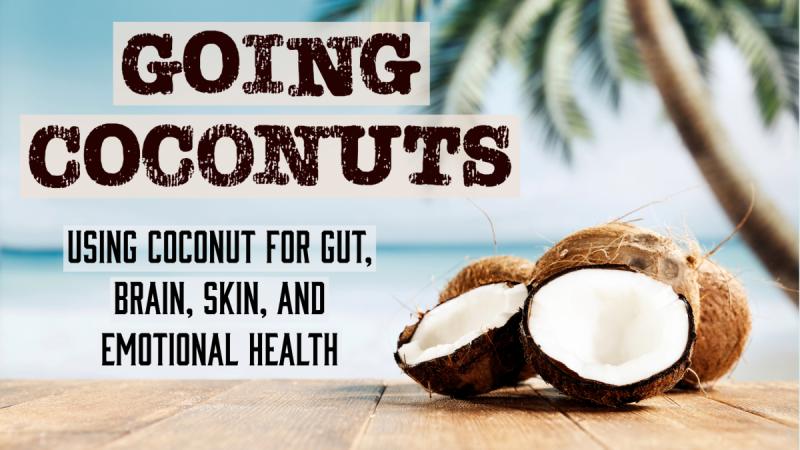
When started doing emotional healing workshops in the late 1990s, I used both flower essences and essential oils to help people process their emotions. One of the fragrances I used was Sudanese coconut oil from Attar Bazar. The fragrance of coconut is sweet, and a little bit earthy, but I think the word that describes its effects best is playful.
While there is no essential oil of coconut, there is a coconut fragrance, which is often used in candles, lotions, and other products. I found that the smell of coconut was helpful for people who were cut off from what I call their “playful inner child.” These people are overly serious and feel guilty about having fun or enjoying themselves. In many cases, they are overly driven work-a-holics, who need help calming down and relaxing. I believe this sweet, playful nature found in the fragrance carries over into the use of coconut for healing.
Coconut Oil
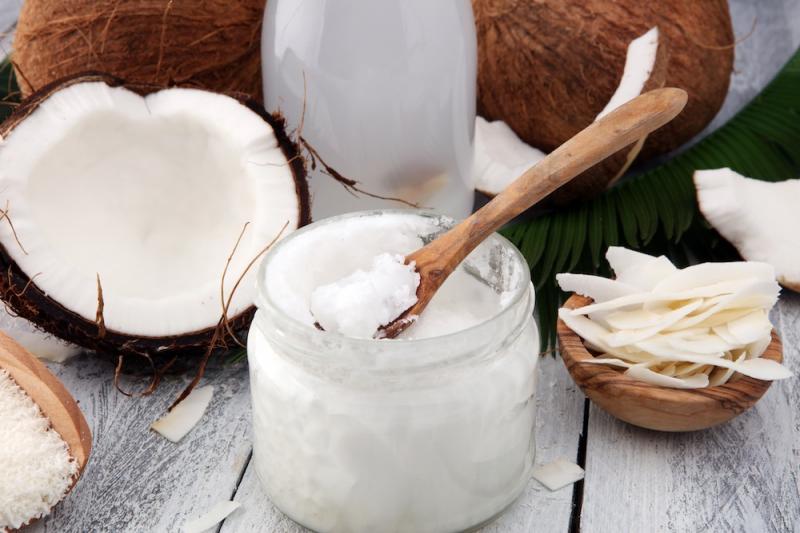 Coconut oil is a fixed oil, not a volatile oil. It’s high in saturated fats and for many years, it was demonized because of the notion that all saturated fats are harmful to your health. It turns out that this isn’t true. While longer chained saturated fats are difficult for the body to metabolize in large quantities, short and medium-chained saturated fats actually have some health benefits. You can learn more about the different types of fats in my article, Understanding Fats.
Coconut oil is a fixed oil, not a volatile oil. It’s high in saturated fats and for many years, it was demonized because of the notion that all saturated fats are harmful to your health. It turns out that this isn’t true. While longer chained saturated fats are difficult for the body to metabolize in large quantities, short and medium-chained saturated fats actually have some health benefits. You can learn more about the different types of fats in my article, Understanding Fats.
Medium-chain triglycerides (MCTs) are currently very popular as a nutritional supplement. MCTs are not stored as fats in the body but are easily metabolized for energy. They appear to satiate appetite so you eat less and help kick start ketosis, which helps you burn fat and lose weight. Here are a few of the benefits that coconut oil has because of the shorter fatty acids it contains.
Coconut Oil and Gut Health
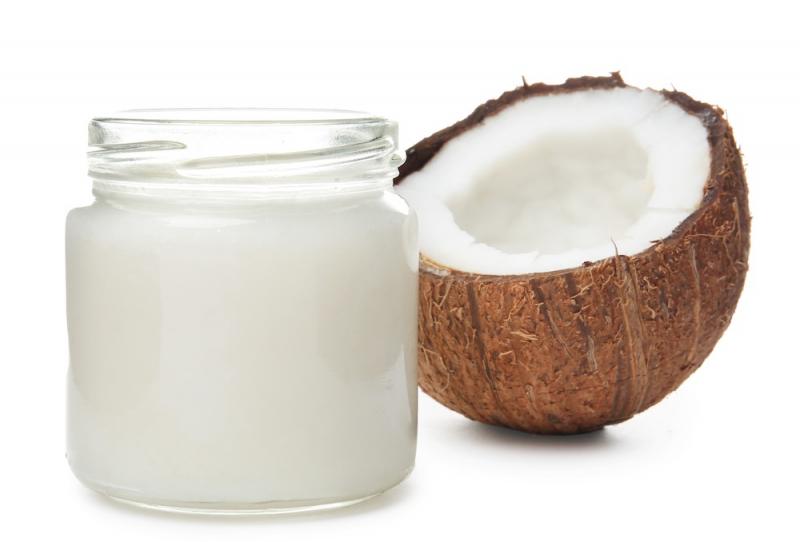 The most prominent fatty acid in coconut oil (over 50%) is lauric acid. Studies suggest that lauric acid has antibacterial effects against E. coli, H. pylori, and several strains of Staphylococcus. Coconut oil also contains the medium-chain fatty acids caprylic and capric acid. Caprylic acid helps the body fight fungal infections. So, coconut oil can help to balance gut microflora.
The most prominent fatty acid in coconut oil (over 50%) is lauric acid. Studies suggest that lauric acid has antibacterial effects against E. coli, H. pylori, and several strains of Staphylococcus. Coconut oil also contains the medium-chain fatty acids caprylic and capric acid. Caprylic acid helps the body fight fungal infections. So, coconut oil can help to balance gut microflora.
You can increase this antimicrobial activity by using coconut oil to deliver essential oils like peppermint into the small intestines to knock down small intestinal bacterial overgrowth (SIBO) and help correct intestinal dysbiosis. Essentially you can use it to create your own enteric-coated peppermint oil, which can be very helpful for many intestinal disorders. Here’s how.
Melt the coconut oil (if it’s not already liquid) by barely warming it. You don’t want it to be hot, just liquid. Calculate the dose you want of essential oils per teaspoon of coconut oil. There are 48 teaspoons in a cup. You want to get about 1-2 drops of peppermint essential oil in each teaspoon of coconut oil. One teaspoon is about 98 drops, so one-half to one teaspoon of peppermint oil per cup would give you the right amount. As soon as the essential oil is added to the coconut oil and stirred in, you want to refrigerate it immediately so that the essential oils are trapped in the solid fat.
You can also use other stronger oils in this recipe, such as cajeput, lavender, lemon, and/or oregano. However, you don’t want a total of more than 2-3 drops of essential oils in each teaspoon of coconut oil. So, you might make a blend similar to the following: 1/2 teaspoon of peppermint oil, 1/4 teaspoon of lemon or lavender, and 1/4 teaspoon of cajeput or oregano.
Here’s how this works. The essential oils bind to the fixed oil, which prevents them from being released in the stomach. Instead, the essential oils are released in the small intestines when the bile salts and pancreatic enzymes start to break down the fats. This delivers the infection-fighting benefits of the coconut oil and peppermint oils into the small intestine where they are needed.
Coconut Oil and the Brain
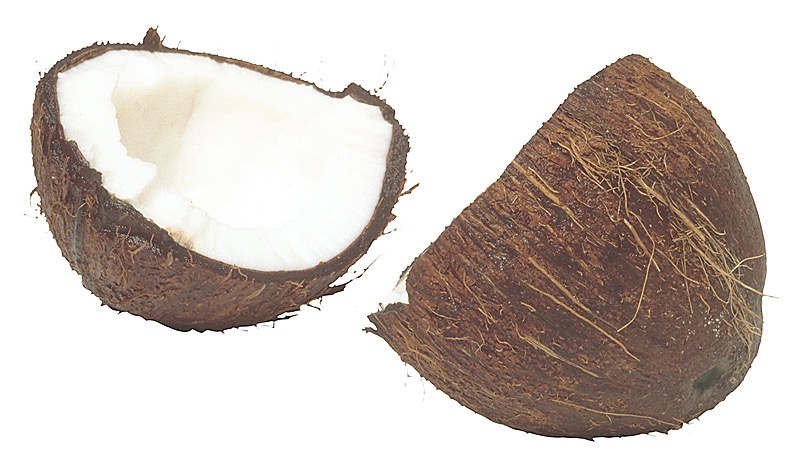 Half of the dry structure of the brain is fats, but these are mostly polyunsaturated fats of the omega-3 variety. But fats are important for the brain because it appears the brain works better when it burns ketones (derived from fats) instead of glucose (derived from carbohydrates) for fuel.
Half of the dry structure of the brain is fats, but these are mostly polyunsaturated fats of the omega-3 variety. But fats are important for the brain because it appears the brain works better when it burns ketones (derived from fats) instead of glucose (derived from carbohydrates) for fuel.
People have used keto or high-fat diets to help control epilepsy, but many people have found that adopting a modified keto diet that includes MCTs or coconut oil may also help. This diet involves cutting out simple carbohydrates, eating more non-starchy (low glycemic carbohydrates) vegetables, and taking coconut oil along with omega-3 essential fatty acids, particularly DHA.
I’ve also seen some evidence that suggests coconut oil can be helpful with Alzheimer's, at least in the early stages of the disease. A diet high in simple carbohydrates might be involved in Alzheimer’s, so cutting out simple sugars and starches while increasing good fats like coconut oil and omega-3s can be helpful for preventing or slowing the progression of this disease. This benefit is highly disputed, but some people appear to have excellent results.
Topical Uses of Coconut Oil
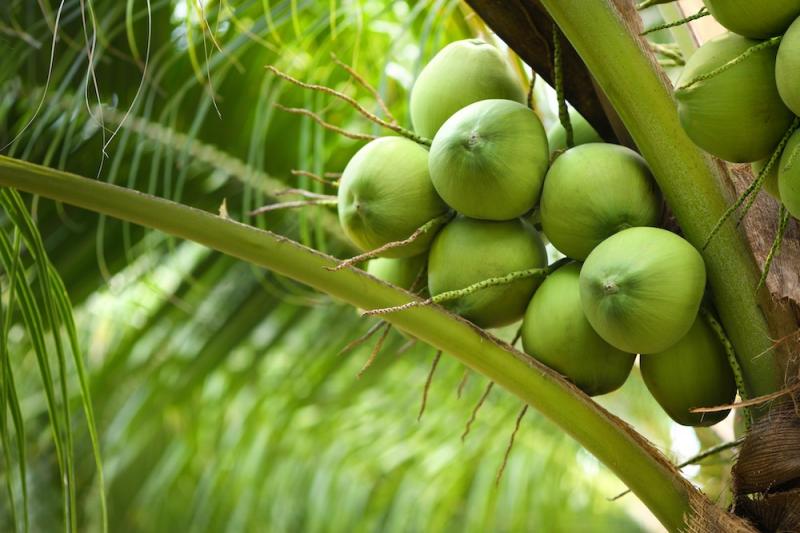 Coconut oil is very moistening to the skin. So, instead of buying expensive body lotions, you can just apply coconut oil to moisten dry skin. You can also add essential oils to it to help with skin problems. If you need an antimicrobial action, you could add oils like tea tree oil, eucalyptus, or myrrh. To aid skin healing you could add helichrysum or lavender. For dry skin, try adding geranium or jasmine.
Coconut oil is very moistening to the skin. So, instead of buying expensive body lotions, you can just apply coconut oil to moisten dry skin. You can also add essential oils to it to help with skin problems. If you need an antimicrobial action, you could add oils like tea tree oil, eucalyptus, or myrrh. To aid skin healing you could add helichrysum or lavender. For dry skin, try adding geranium or jasmine.
In addition, coconut oil makes a good base for salves. You can infuse the herbs into warm oil in a crock pot, and because coconut oil is solid at room temperature, you don’t need to add beeswax to harden it enough to apply it. You can also just mix herb powders into the coconut oil for an instant salve.
You can use astringents, like white oak bark or witch hazel, in coconut oil and apply it topically for hemorrhoids. You can use herbs like comfrey and plantain to aid skin healing and so forth.
Coconut as a Health Food
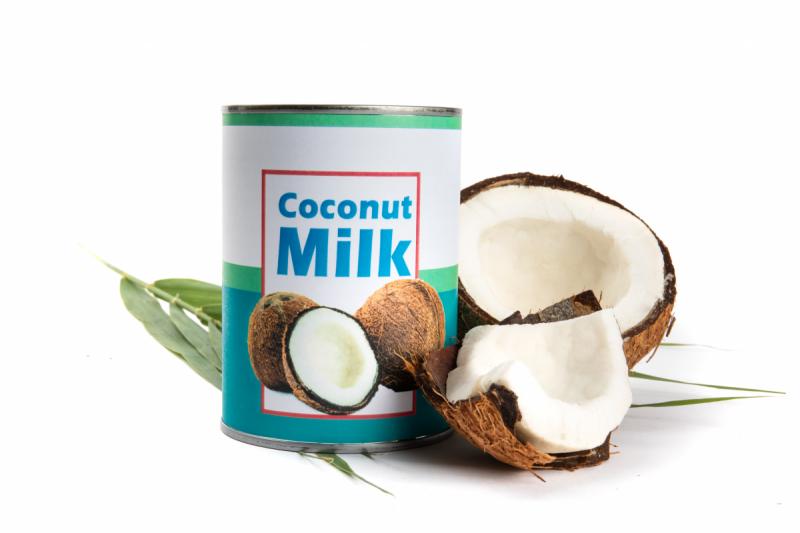 Coconut meat (fresh or dried) is a source of healthy fat, but it's also a good source of fiber and has a reasonable amount of protein. It’s low in carbohydrates but is naturally sweet, which is why it’s nice to use in baking.
Coconut meat (fresh or dried) is a source of healthy fat, but it's also a good source of fiber and has a reasonable amount of protein. It’s low in carbohydrates but is naturally sweet, which is why it’s nice to use in baking.
When making herbal nut butter balls, I like to use shredded coconut. They are made by mixing herb powders with a nut butter and honey and forming them into bite-sized balls. They tend to be pretty sticky, so I'll roll them in coconut to add extra flavor and make them easier to handle. The School of Botanical Studies has some good recipes in their article, How to Make Herbal Balls.
Coconut milk and coconut cream have a variety of uses and can easily be substituted for regular dairy milk when desired. You can add coconut milk or cream to smoothies, use them to make dairy-free ice cream, or use them as a non-dairy creamer in coffee or tea. I’ve also used coconut milk in making curry dishes. It’s wonderful.
Coconut Water
 When I was little and our family would buy a coconut from the grocery store, we used to love to punch holes through the eye of the coconut and get the water found inside so we could drink it. Now, coconut water has become a very popular beverage. It's a natural electrolyte replenisher and is reported to have other health benefits as well. It contains potassium, magnesium, and calcium, and unlike the rest of the coconut products, it is low in fat.
When I was little and our family would buy a coconut from the grocery store, we used to love to punch holes through the eye of the coconut and get the water found inside so we could drink it. Now, coconut water has become a very popular beverage. It's a natural electrolyte replenisher and is reported to have other health benefits as well. It contains potassium, magnesium, and calcium, and unlike the rest of the coconut products, it is low in fat.
Coconut water is reported to have antioxidant properties, help prevent kidney stones, support heart health, and help balance blood sugar. I don't personally drink it because I think it's too expensive to consume regularly. But I still like to drink it whenever I buy an actual coconut.
Cooking with Coconut Oil
Coconut oil is a good oil for cooking because it is high in saturated fats, which means it won’t form harmful transfats when you cook with it. I’ve personally used it in place of ghee in recipes for Indian curries. You can mix it with olive or avocado oil, as well.
Coconut oil also stores well. I’ve always believed in emergency preparedness and always have some food storage, which I rotate, in case of emergencies. Olive oil and other natural oils can go rancid when stored for long periods. Refined oils last longer, but they aren’t that healthy. So, while I keep back-up bottles of olive oil and avocado oil in my pantry, I use coconut oil for long-term storage of fat for eating and cooking.
Coconut Oil Fudge Recipe
Here’s a great recipe for a tasty dessert using coconut oil. I got the idea from a recipe on a calendar from my local Natural Grocers, but as I typically do, I've modified the recipe and created my own variation of it.
Ingredients
- 1 cup coconut oil
- 1 cup almond butter
- 1/2 cup honey
- 1/3 cup cocoa powder
- 1 teaspoon real vanilla extract
- 1-2 cups of coarsely chopped roasted and salted macadamia nuts
Directions
Place all the ingredients except the nuts into a mixing bowl and blend with an electric mixer until smooth. Fold in the chopped nuts and place into an 8x8 baking pan. Refrigerate until firm and cut into squares. Keep in the fridge until ready to serve as the coconut oil melts at room temperature.
These are amazing treats. In fact, I just made a batch while I was working on this article because I was reminded of how good it tastes.
I hope this article has helped you see the many possibilities for using coconut yourself. If you’re having trouble with your digestion, and memory, or just being too serious and stressed out, try adding coconut as a playful addition to your health program. It doesn’t hurt to go a little coconut once in a while.
Downloads
Steven's Articles
-

-
Reishi (Ganoderma) Mushroom
A TCM remedy for calming the shen (spirit), balancing…
-

-
Eucommia Bark
A superior tonic that promotes kidney, structural,…
January
-

-
Goldenthread, Phellodendron, and Yellow Root
Three herbal remedies containing the infection-fighting…
-

-
Teasel
A traditional herb for healing bones and joints…
-

-
Barberry and Healthy Personal Boundaries
A thorny shrub for fighting infections and supporting…
December
-

-
The Evidence for Berberine
A yellow alkaloid found in traditional infection-fighting…
-

-
The Sensible Use of Caffeinated Herbs
Kola nuts, guarana, and yerba mate and other herbs…
-

-
The Health Benefits and Problems with Coffee
This popular caffeinated beverage can be beneficial…
October
-

-
Understanding Caffeine & Cellular Adaptation
Preserving the power of caffeine's buzz and the…
September
-

-
Horseradish
A pungent spice for aiding protein metabolism…
-

-
Banaba or Crepe Myrtle
A beautiful tree from Southeast Asia whose leaves…
August
-

-
Monkeyflowers
Flower essences to help see ourselves more clearly…
-

-
Mariposa Lilies
Strengthening the bond between mother and child…
-

-
The Noble Bay Leaf
A common kitchen herb for aiding digestion and…
-

-
Epimedium: Horny Goat Weed
A circulatory stimulant and kidney yang tonic…

